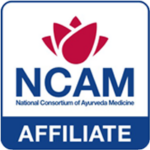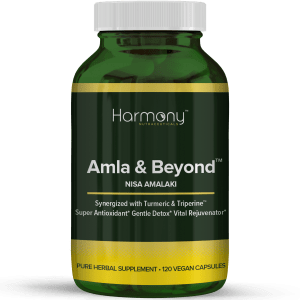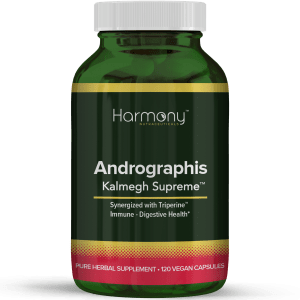Ayurveda for Healthy Nails: Tips, Herbs & Fungus Treatment
In Ayurveda, the health of your nails is considered a reflection of your overall health. Just as glowing skin and lustrous hair are signs of balance and well-being, strong and shiny nails indicate that your body is functioning optimally. According to Ayurveda, nails are a byproduct of the bone tissue (Asthi Dhatu), and their condition can reveal a lot about your nutritional status, bone health, and overall vitality. When your nails become brittle, discolored, or infected, it could be an indication of an imbalance in your body’s doshas, especially Vata and Pitta.
This article will explore Ayurveda for healthy nails, including tips for strengthening nails, herbal remedies for nail health, and Ayurvedic treatments for nail fungus. With a holistic approach, Ayurveda provides natural solutions to maintain nail health, treat infections, and promote nail strength and shine.
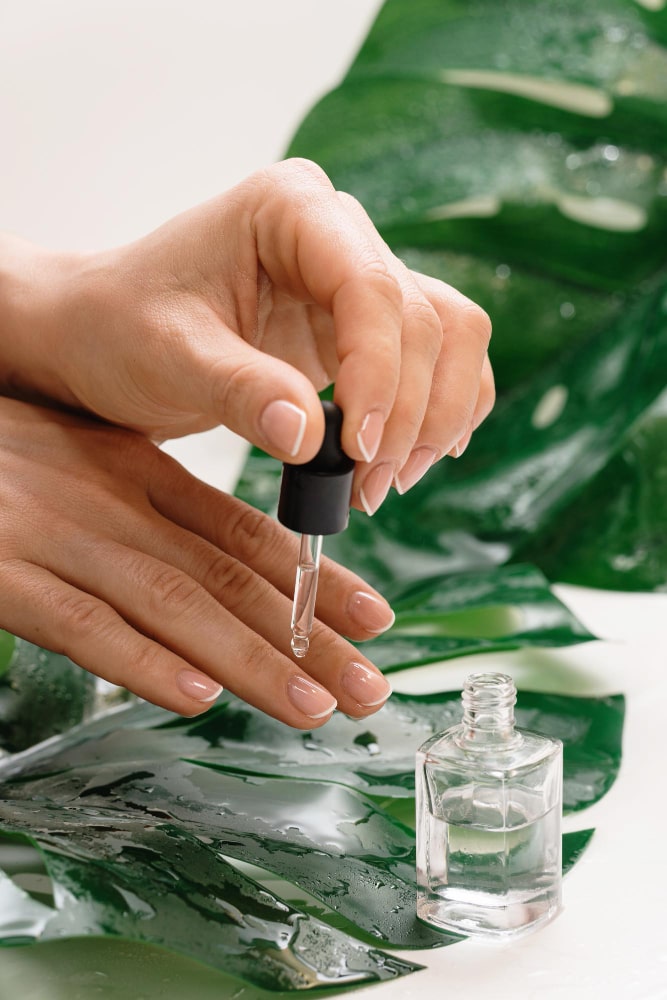
Understanding Nail Health in Ayurveda
Ayurveda views the body holistically, meaning that any visible symptoms, such as weak or unhealthy nails, are considered signs of deeper imbalances in the body. In the case of nail health, Ayurveda primarily focuses on nourishing the Asthi Dhatu (bone tissue), as healthy bones and nails are interconnected. Weak nails can be a sign of a Vata imbalance, which is linked to dryness, brittleness, and poor nutrient absorption.
Additionally, toxins (Ama) that accumulate in the body due to poor digestion can also impact nail health. Therefore, addressing nail issues requires improving digestion, balancing the doshas, and nourishing the body with the right nutrients.
Ayurvedic Tips for Healthy Nails
Ayurveda recommends several lifestyle and dietary practices to promote strong, healthy nails. These tips not only enhance nail health but also contribute to overall wellness:
1. Nourish from Within
A well-balanced diet is essential for healthy nails. Since nails are related to the Asthi Dhatu, it’s important to consume foods that support bone health and provide essential minerals like calcium, magnesium, and zinc. Incorporate foods rich in these nutrients such as Leafy greens (spinach, kale), Nuts and seeds (almonds, sesame seeds), Dairy products (milk, yogurt), Healthy fats (ghee, olive oil)
These foods help nourish the tissues responsible for nail formation and strengthen nails from the inside out.
2. Hydrate to Combat Dryness
Dry, brittle nails are often a sign of Vata dosha imbalance. Hydration is key to maintaining moisture levels in the body and ensuring that nails remain strong and flexible. Drink plenty of warm water or herbal teas throughout the day, and incorporate hydrating foods like cucumbers, melons, and soups into your diet.
Additionally, Ayurveda suggests applying oil to the nails and cuticles regularly to maintain moisture. Warm sesame oil or coconut oil massaged into the nails can help to prevent dryness and cracking.
3. Practice Regular Nail Care
Taking care of your nails through gentle grooming is important in Ayurvedic nail health. Avoid harsh chemicals, excessive filing, or nail treatments that could weaken the nail bed. Instead, practice regular nail trimming, use natural nail oils, and avoid exposure to water for prolonged periods, as it can weaken nails.
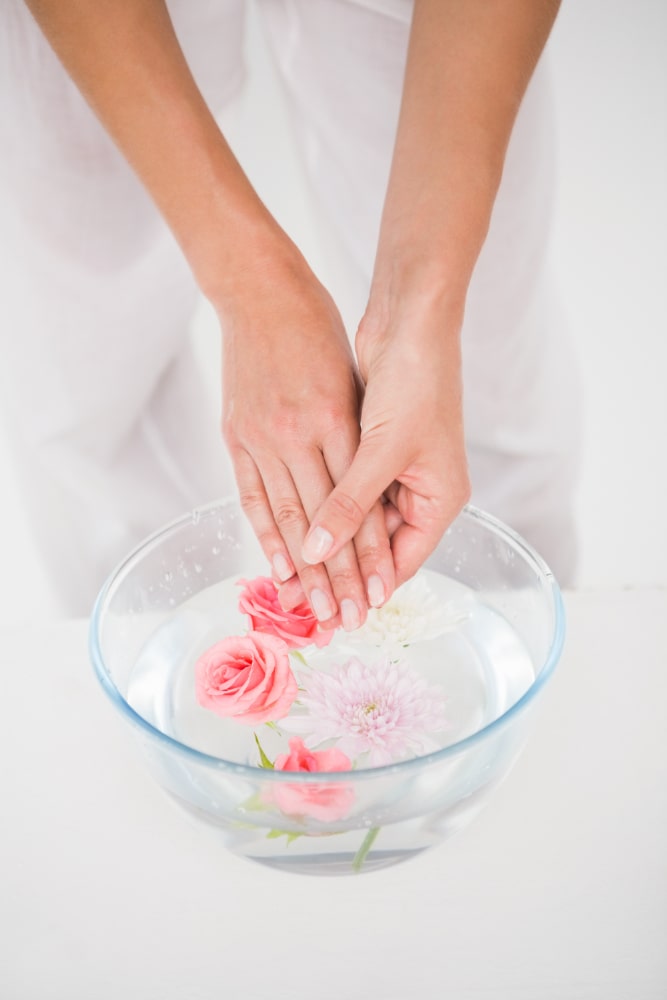
4. Detoxification for Nail Health
Poor digestion and toxin buildup (Ama) in the body can manifest as nail issues. To maintain healthy nails, it is essential to keep the digestive fire (Agni) strong and eliminate toxins regularly. Practices like Ayurvedic detoxification Using Triphala or a seasonal cleanse can help to remove toxins and support overall health, including the condition of your nails.
Ayurvedic Herbs for Healthy Nails
Ayurveda offers several herbs that help strengthen nails and support overall nail health. These Ayurvedic herbs for nails are rich in nutrients and help balance the doshas, particularly Vata and Pitta, which are often responsible for nail issues.
1. Ashwagandha
Ashwagandha is a powerful adaptogen that nourishes the body’s tissues, including the bones and nails. By improving the health of the Asthi Dhatu, ashwagandha supports strong and resilient nails. This herb also helps to reduce stress, which can often weaken the nails and lead to breakage.
2. Amla (Indian Gooseberry)
Amla, rich in Vitamin C and antioxidants, strengthens nails from within by promoting collagen production. Its rejuvenating properties nourish the nail bed, supporting growth and preventing brittleness. Regular intake of Amla boosts overall nail health, keeping them strong and vibrant.
A well-balanced diet is essential for healthy nails. Since nails are related to the Asthi Dhatu, it’s important to consume foods that support bone health and provide essential minerals like calcium, magnesium, and zinc. Incorporate foods rich in these nutrients such as Leafy greens (spinach, kale), Nuts and seeds (almonds, sesame seeds), Dairy products (milk, yogurt), Healthy fats (ghee, olive oil)
These foods help nourish the tissues responsible for nail formation and strengthen nails from the inside out.
3. Brahmi
Brahmi is known for its rejuvenating and balancing properties. It supports the health of the nervous system and reduces stress, which can contribute to nail brittleness and breakage. Brahmi also nourishes the tissues and promotes the growth of strong nails.
4. Neem
Neem is a powerful antimicrobial herb often used in Ayurvedic skin and nail care. It helps cleanse the body of toxins and supports healthy nail growth. Neem oil can be applied topically to nails to strengthen them and protect against infections.
5. Triphala
Triphala, a blend of three fruits (Haritaki, Bibhitaki, and Amla), is a potent detoxifier and digestive aid in Ayurveda. By improving digestion and eliminating Ama, Triphala supports overall health and promotes nail strength.
Discover Ayurvedic products that promote strong, healthy nails. Shop now!
Ayurveda Treatment for Nail Fungus
Nail fungus, known as Onychomycosis, is a common condition that can cause thick, discolored, and brittle nails. According to Ayurveda, nail fungus is often associated with an imbalance in the Kapha and Pitta doshas, resulting in excess moisture and heat in the body, which creates an environment conducive to fungal growth.
Ayurveda treatment for nail fungus focuses on reducing Kapha and Pitta imbalances, detoxifying the body, and using antimicrobial herbs to treat the infection.
1. Neem Oil
Neem is one of the most effective Ayurvedic remedies for treating nail fungus. Its antifungal and antimicrobial properties help fight infections and promote healthy nails. Applying neem oil directly to the affected nails can reduce the growth of fungus and support the healing process.
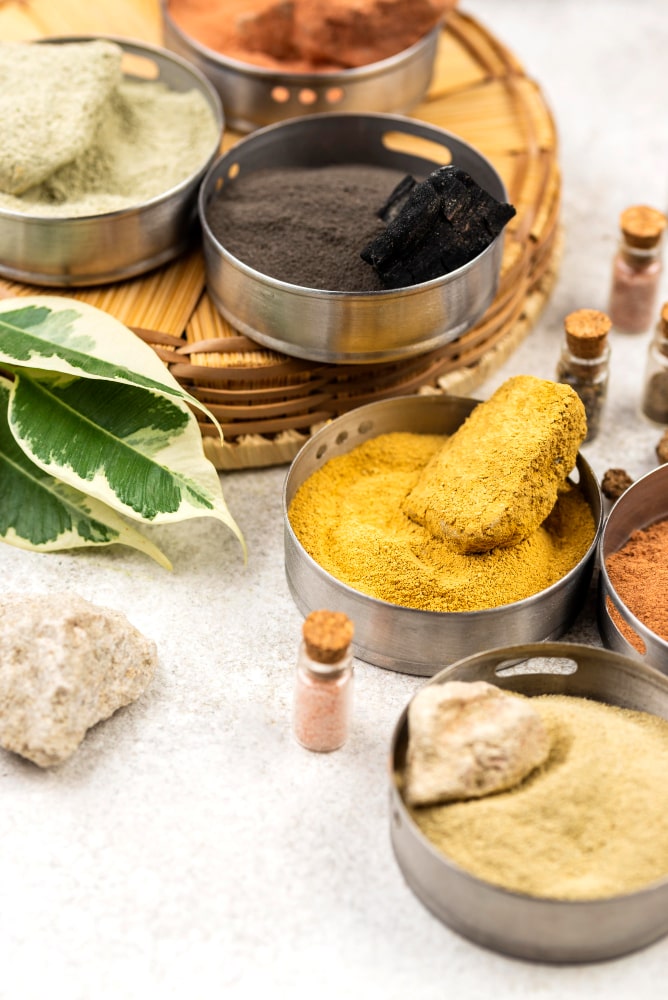
2. Turmeric
Turmeric is known for its powerful anti-inflammatory and antifungal properties. You can create a paste using turmeric powder and water or coconut oil and apply it to the infected nails. This not only helps treat the fungus but also reduces inflammation and discoloration.
3. Garlic
Garlic has potent antifungal properties that can help fight nail fungus. You can crush a few garlic cloves and apply the paste to the affected nails. Regular application can significantly reduce the fungal infection and promote nail health.
4. Ayurvedic Herbal Powders
A combination of Ayurvedic herbal powders like Triphala and Manjistha can be used to detoxify the body from within. Triphala aids in digestion and the elimination of toxins, while manjistha supports the lymphatic system and cleanses the blood, helping to resolve fungal infections.
5. Epsom Salt and Warm Water Soak
A warm water soak with Epsom salt can help relieve discomfort caused by nail fungus. Soaking your feet or hands in warm water for about 15-20 minutes softens the nails and helps the antifungal treatments penetrate more effectively. Adding neem powder or tea tree oil to the soak can further enhance its antifungal properties.
Ayurvedic Treatment for Toenail Fungus
Toenail fungus can be particularly stubborn, as the toenails tend to have less blood circulation and are often exposed to moisture. Ayurvedic treatment for toenail fungus requires a combination of topical and internal remedies to address the root cause of the infection and promote healing.
1. Application of Coconut Oil and Camphor
Ashwagandha is a powerful adaptogen that nourishes the body’s tissues, including the bones and nails. By improving the health of the Asthi Dhatu, ashwagandha supports strong and resilient nails. This herb also helps to reduce stress, which can often weaken the nails and lead to breakage.
2. Diet and Lifestyle Changes
Since fungal infections are related to an excess of moisture and heat in the body, Ayurveda recommends reducing Kapha and Pitta aggravating foods like oily, spicy, and heavy foods. Instead, focus on light, astringent, and bitter foods like leafy greens, legumes, and cooling spices such as coriander and fennel.
3. Pranayama (Breathing Techniques)
Incorporating Pranayama, especially cooling breathing exercises like Sheetali and Sheetkari, helps reduce Pitta in the body, which is often linked to inflammation and infections like nail fungus.

Preventing Nail Fungus with Ayurvedic Practices
Prevention is key when it comes to maintaining healthy nails and avoiding fungal infections. Here are some Ayurvedic practices to prevent nail fungus and keep your nails strong and healthy:
Keep your nails clean and dry
Avoid exposing your nails to excessive moisture, and always dry them thoroughly after washing
Wear breathable footwear
Choose shoes made from natural, breathable materials to prevent moisture buildup that can lead to toenail fungus.
Avoid harsh nail products
Limit the use of chemical nail polish and nail treatments, as they can weaken the nails and make them more susceptible to infections.
Boost your immune system
A strong immune system can help your body fight off fungal infections more effectively. Include immune-boosting herbs like Ashwagandha, Amla, and Tulsi in your diet.
Conclusion
Incorporating Ayurveda for healthy nails involves nourishing your body from within, practicing mindful nail care, and using natural remedies to address issues like nail fungus. By following Ayurvedic principles and incorporating herbal treatments, You can promote strong, healthy nails and prevent common problems like nail fungus. Whether you’re seeking to enhance your overall nail health or address a specific issue like toenail fungus, Ayurveda offers a holistic approach that can lead to long-lasting results.






